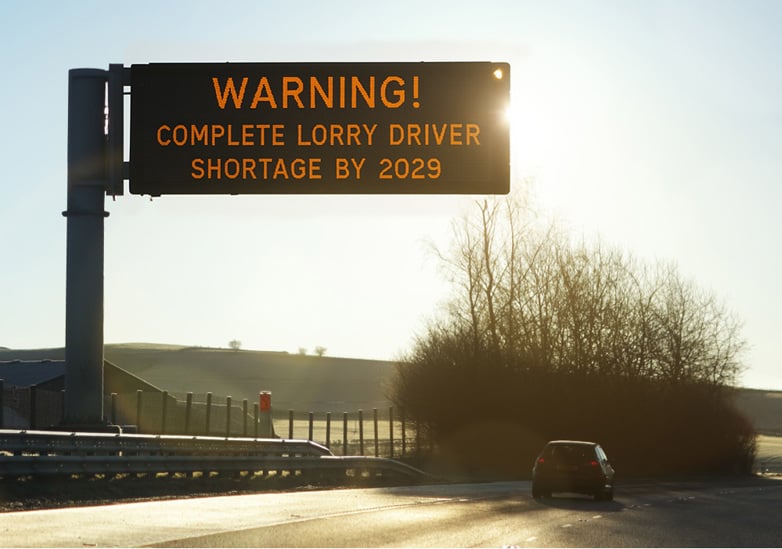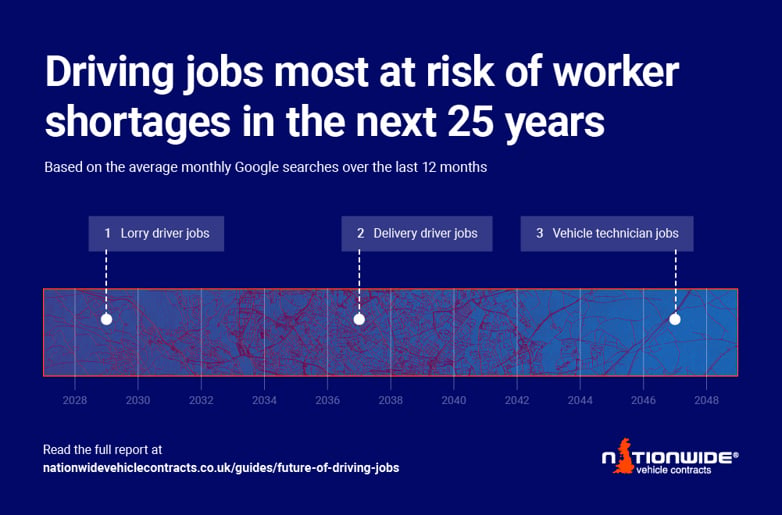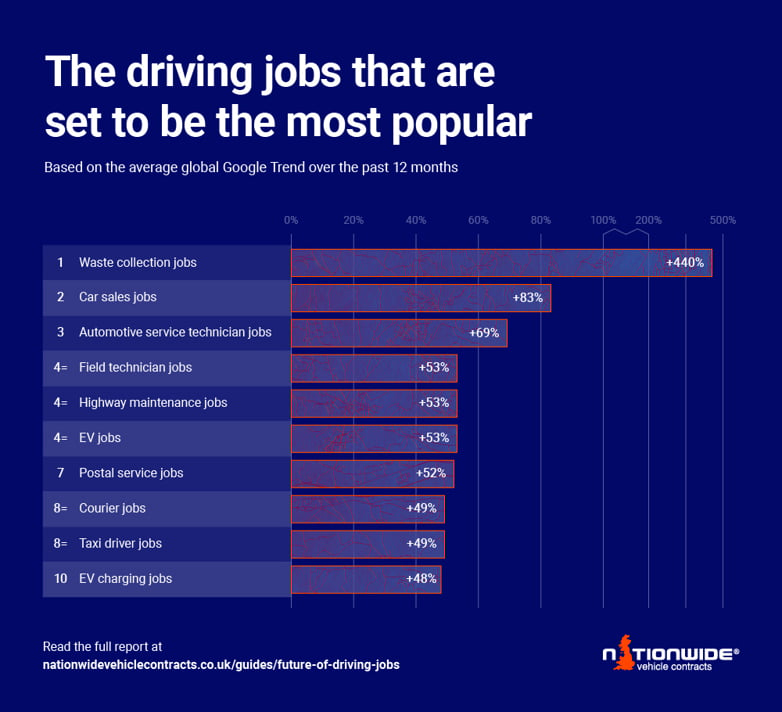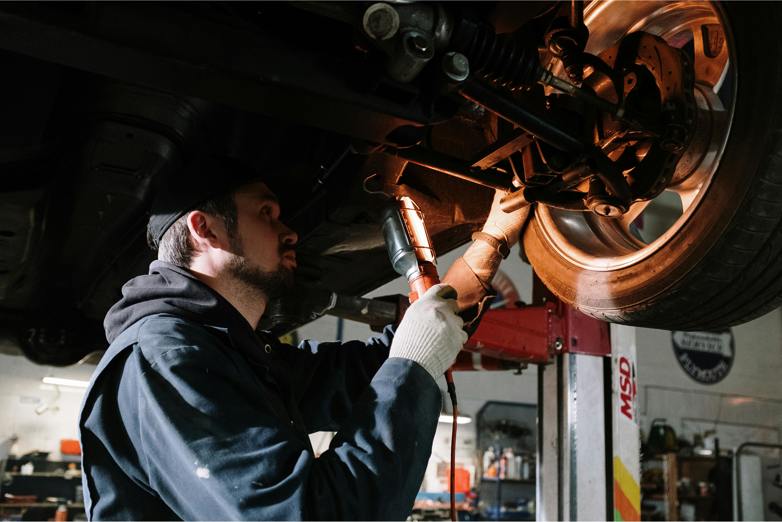The driving-related jobs in the UK that are set to boom and bust by 2050

The job market in the UK is constantly evolving, and with the expansion of AI and technology, many industries must continue to adapt for their future.
As of 2025, the UK automotive industry as a whole continues to boom, valued at approximately £100 billion [1]. However, with new legislation, such as the goal of 80% of electric vehicle manufacturing by 2030 and beyond, the industry is poised for a significant shift in its workforce.
As particular driving-related jobs are being favoured over others, there is a growing concern over automotive occupations that are experiencing workforce shortages. Interest in ‘why shortage of HGV drivers’ has soared by 600% over the past five years in the UK [2], highlighting the issues the sector continues to face around filling skills gaps.
With this, we’ve analysed search data to uncover which automotive jobs face a complete shortage in the next 25 years, with some expected as early as 2029, in addition to the most popular driving jobs requiring more workers soon.
The key findings were:
- HGV (Heavy Goods Vehicle) drivers predicted to be in a complete shortage by 2029
- 45,000 delivery drivers are needed to bridge the skills gap, as a shortage is predicted by 2037
- The demand for waste collection jobs has soared by 440% in the past 12 months in the UK
- EVs are impacting the manufacturing and maintenance roles in the industry
Our research has revealed the driving jobs which are facing the largest shortages by 2050, as searches plummet in particular areas within the UK automotive industry.

With only 4,400 monthly searches for ‘lorry driver jobs’, the demand for HGV (Heavy Goods Vehicle) drivers in the UK is experiencing a sharp decline [2]. Based on this, projections indicate that the role could face a complete shortage by 2029, less than five years from now.
In 2020, the UK employed approximately 278,700 HGV drivers. Between 2023 and 2024, the sector saw a notable 20.9% increase in workforce numbers, equating to an additional 54,961 drivers [3].
Despite this growth, the industry continues to face a substantial shortfall due to an ageing workforce, a lack of qualified drivers and the lasting impacts of Brexit. To meet anticipated demand and avoid service disruptions, an estimated 200,000 additional drivers will be required by 2029 to support the shortage [4].
August 2024 saw a peak in lorry driver vacancies, where job adverts exceeded 20,000 in that month alone. However, with the average salary for lorry drivers being 13.9% lower than the national average salary, this could lead to continued shortages. Interestingly, lorry driver jobs being advertised in the UK are most popular in South East England, making up over 1 in 10 of the total jobs (13%) [5].

One of the key contributing factors to this shortage is that more than half of the current HGV drivers are aged 50 or above, placing a large portion of the workforce at risk of retirement within the next few years.
Driverless lorries were first announced to be trialled in the UK almost a decade ago, in 2016. As of 2025, there are still no fully driverless lorries in operation. However, AI is playing a more integral role in HGV driving today regarding safety. Modern HGVs are now equipped with AI systems that provide real-time safety insights, helping to prevent collisions and driving fatigue. The systems support drivers by issuing alerts for rest breaks and potential hazards on the road to improve work-life balance.
Keith Hawes, Director at Nationwide Vehicle Contracts, adds: “The development of autonomous driving depends on all vehicles being able to communicate seamlessly with one another.
“In reality, the first widespread application of this technology is more likely to be in taxi services. For that reason, taxi drivers may be more at risk of being replaced before lorry drivers.
“When it comes to commercial transport, safety is absolutely critical. The idea of a 42-tonne lorry, complete with trailer and load, being driven autonomously on open roads still feels far off. In my view, we’re unlikely to see this as a mainstream reality before 2050.”
According to the Office for National Statistics (ONS), there are currently 246,000 delivery drivers employed across the UK [6]. However, an estimated 30,000 additional drivers are needed to meet growing demand in the sector [7].
Projections based on average monthly Google search trends suggest that delivery driver roles could experience a full shortage by 2037, as people explore different job options. With over 135,00 delivery driver vacancies in April 2025, this has surged by 792.6% compared to last year. Among the top companies hiring are Just Eat, My Four Wheels, Yodel, Tesco and Royal Mail, showing the most popular jobs relate to food delivery, driving instructors, online e-Commerce deliveries and supermarket shopping [8].
To address the growing shortfall and potential decline, the industry must prioritise investment in training and development programmes to make the profession more appealing.
Due to the current decline in demand, vehicle technician jobs could face a complete shortage in the UK by 2047 [2]. As of early 2025, there are currently 245,000 vehicle technicians according to IMI, but additional workers are needed to bridge the gap between the increasing number of EV vehicles [9].
Vehicle technicians have a more advanced role than automotive service technicians and are responsible for advanced diagnostics, repairs and work on more complex systems such as HGVs. The demand for specialist technicians, such as those trained in EV roles, is rising, and of the current workforce, just 24% represent those who are qualified to work on EVs [10].
Several factors are contributing to the shortage of vehicle technicians, the most significant being the rapid adoption of electric vehicles, which is outpacing the availability of skilled technicians. At the same time, much of the current workforce is ageing, and the industry is struggling to attract and recruit new apprentices to fill the gap.

Despite the steep decline in interest for several important driving-related roles in the UK, the demand for others has begun to increase over the last year.
For some industries experiencing a serious skills shortage, including construction work, this serves as a positive indicator that demand for those skilled positions is starting to shape an alternative attitude.
Despite the decline of various roles that require driving, others are booming, most notably waste collection jobs, with a demand increase of +440% in Google searches in the last year in the UK [2].
Although growth in the number of people working in the role is moderate, the number of those working in waste collection is due to increase between 2024 and 2028 from 127,160 to 133,340 2028, which is a 4.86% increase [11].
Several factors are driving the need for those in waste collection, including the growing population leading to increased urbanisation and consumerism in the UK.
This amounts to additional waste, despite the UK Government's effort to encourage recycling methods across the country; all waste still needs to be managed efficiently by the industry.
Data from the Institute of the Motor Industry (IMI) suggests a projected decline of 2% in the number of car salespeople between now and 2031, from 569,598 in 2021 to 557,484 in 2031 [12].
However, searches suggest that the role could be one of the most popular in the driving industry going forward. Over the past year, the demand for ‘car sales jobs’ has grown by 83% [13], highlighting that the interest in pursuing a career in vehicle sales is increasingly popular in the UK.
In Q1 2025, used car units surpassed 2 million, the first time since 2019 [14]. The rise of used cars in garages across the country will make way for new aspiring car sales agents in a booming market.
The UK new car market is also set to increase by 2% in 2025 [15], which raises the demand for additional salespeople. With this, some dealerships are expanding their recruitment to individuals with wider customer service skills to meet expanding needs beyond the automotive industry.
Demand for automotive service technician jobs is currently seeing a peak in demand, with searches for roles in the industry increasing by 69% in the UK over the past year [2]. With an estimated 160,000 skilled workers needed in the automotive industry by 2031, according to the IMI, the high interest in the career highlights a promising forecast [16].
Automotive service technicians are responsible for diagnosing, repairing, and maintaining vehicles, and current job ads are linked to engineering and maintenance. The number of vacancies is gradually decreasing as more workers take on the growing demand [17].
The UK's Zero Emission Vehicle (ZEV) initiative, which came into effect in January 2024, sets a clear path towards a fully electric vehicle market by 2035 in the UK. This is changing the role of automotive service technicians as we know it, as technicians must advance in their existing skills and adapt to new technological systems.
This puts the focus on EV service technicians who are specialised and prepared for the evolving market [18].

Not only are EVs creating a shift in demand for driving jobs in the UK. The mass transition to EVs will reshape the automotive service, manufacturing, and recycling industries, requiring new skills, technologies, and infrastructure.
Electric vehicles require significantly less servicing and fewer parts than internal combustion engine (ICE) vehicles. This will impact the demand for service centres and parts distribution. While there will still be a large number of used ICE vehicles on the road for some time, their numbers will steadily decline [19].
- Specialist training & investment: Servicing EVs requires specialised training and equipment. This investment may deter smaller service businesses, and with reduced servicing needs, both labour hours and parts revenue will decline.
- Rise of IT-based maintenance: EVs rely heavily on software, allowing manufacturers (OEMs) to update systems and adjust vehicle settings remotely, reducing the need for traditional service technicians. As a result, there may be a greater demand for IT specialists rather than mechanics. The UK currently employs 866k people in the automotive sector, but only a small number are IT specialists, so there will be a need to recruit [20].
- Changes in manufacturing: EVs require fewer mechanical components, reducing the need for heavily engineered parts like engine casings and pistons. Instead, manufacturers will use more plastics and lightweight composite materials. Apart from wheels and tyres, EVs will look and function very differently from traditional vehicles.
- Battery disposal & reuse: In the UK, currently, a combination of both reusing and recycling is used for EV batteries, depending on their suitability, as UK law bans landfilling or incinerating EV batteries. A new industry must be prepared to manage the increased number of batteries and ensure efficient end-of-life disposal and repurposing of EV batteries.
We can expect to see significant changes in the automotive industry over the coming decades, with some of the most crucial roles in the industry facing a mass shortage, while others are set for an exciting future.
Although this industry change may not affect all people, driving is essential for life and finding the right vehicle, no matter where your career, business or life takes you, you can guarantee you’ll find a fitting lease vehicle at Nationwide Vehicle Contracts.
Using Keywordtool.io, we identified the auto industry jobs which require a driving license had the highest average monthly search volume in the past 12 months and what the average trend was over the last 12 months of search.
We then used Google Trends and Glimpse to identify what job trends looked like over the past 5 years with search volume, and extrapolated the date that searches for these jobs would become extinct, to reveal the industries most at risk of shortages.
[1] Value of UK auto market - SMMT
[2] UK Search Data - Google Trends accurate on 27/05/25
[3] UK HGV driver sector - Logistics UK
[4] HGV drivers demand - Road Haulage Association (RHA)
[5] HGV driver job adverts - Adzuna
[6] Number of delivery drivers - Office for National Statistics (ONS)
[7] Demand for delivery drivers - Pegasus Couriers
[8] Delivery driver job adverts - Adzuna
[9] Number of vehicle technicians - Institute of the Motor Industry
[10] EV trained vehicle technicians - Net Zero Club
[11] Number of waste collectors - Statista
[12] Number of car salespeople - Institute of the Motor Industry (IMI)
[13] UK Search Data - Keyworldtool.io
[14] UK Used Car Units - SMMT
[15] UK New Car Market - Auto Trader
[16] Automotive skills gap - Institute of the Motor Industry (IMI)
[17] Automotive technician stats - Adzuna
[18] EV service technicians - Auto Tech Training
[19] Global EV outlook - IEA
[20] UK Automotive workforce - Institute of the Motor Industry (IMI)
Guide Information
Originally published: 27th June 2025
Last updated: 27th June 2025
Due to be reviewed: 27th June 2026
